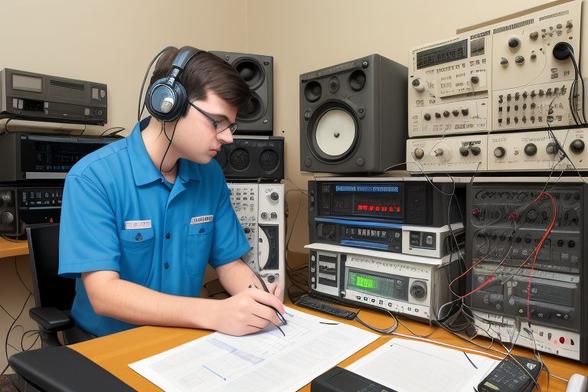Mastering FCC Regulations: Essential Rules Every Amateur Radio Technician Must Understand
1,582 words, 8 minutes read time.
In the world of amateur radio, understanding the rules and regulations is not just a matter of compliance—it’s about ensuring a responsible, safe, and enjoyable experience for everyone involved. As an amateur radio technician, navigating the intricacies of the Federal Communications Commission (FCC) regulations is crucial. These rules, primarily governed by Part 97 of the FCC regulations, outline the responsibilities, privileges, and limitations of amateur radio operators.
The purpose of this document is to break down the most critical FCC regulations that every technician should be aware of. Whether you’re a new technician preparing for your exam or an experienced operator seeking to ensure your activities are compliant, this guide will serve as your go-to resource for understanding the regulations that shape amateur radio practice in the U.S.
The Basics of Part 97 – The Core of Amateur Radio Regulations
The core of the FCC’s regulation of amateur radio lies in Part 97 of the FCC rules. Part 97 outlines the technical standards and operational rules that apply to all amateur radio stations in the United States. This part of the regulations defines how amateur radio operators may use the airwaves and the conditions under which they can operate.
Key definitions include:
- Station: Any apparatus capable of transmitting or receiving radio signals.
- Licensee: The person who holds an FCC-issued amateur radio license.
- Frequency Bands: Specific ranges of frequencies allocated for amateur radio use.
- Amateur Radio Service: A service that allows licensed individuals to use radio frequencies for non-commercial purposes, including experimentation, public service, and personal communication.
Part 97 is divided into subparts, each addressing specific issues, from licensing procedures to operational restrictions. Technicians must familiarize themselves with these regulations to avoid violations, which could lead to fines or revocation of their licenses.
Key FCC Rules Every Technician Must Know
As a technician, there are several fundamental FCC rules you need to be aware of. These rules cover a range of topics from licensing requirements to operating procedures and restrictions on transmissions.
Licensing Requirements:
To operate an amateur radio station legally, you must obtain a license from the FCC. The Technician license is the entry-level license, which allows you to operate on certain frequencies and bands. To qualify for a Technician license, applicants must pass a written exam that covers basic radio theory, FCC regulations, and operating practices.
Operating Guidelines:
Technicians have the privilege to use specific frequencies, primarily in the VHF and UHF bands, as well as a limited portion of the HF bands. However, the rules governing these frequencies come with specific power output limits. For example, technicians are permitted to use up to 200 watts of power on certain bands, while others may have more restricted power limits.
Restrictions on Transmissions:
Amateur radio operators are prohibited from using their stations for any form of commercial use or to transmit obscene or indecent content. Additionally, the FCC prohibits operators from broadcasting music or using their stations for paid public communications. The key here is that amateur radio is for non-commercial, personal use, as outlined under Part 97.113.
Emergencies and Public Safety:
Part 97 places a strong emphasis on the role of amateur radio in emergency situations. Technicians, like all licensees, must be ready to provide communication services in times of disaster or public safety needs. This could include aiding in local, state, or national emergency situations where conventional communication systems are down. Operators must follow specific procedures, like those in 97.403, to ensure that they act in the best interest of the public during emergencies.
The Technician License: Specific Rules and Privileges
As a Technician license holder, you are granted the opportunity to operate on several important amateur radio bands. These include:
- VHF (Very High Frequency): Bands such as the 2-meter and 1.25-meter bands (144-148 MHz and 222-225 MHz).
- UHF (Ultra High Frequency): Bands like the 70-centimeter band (420-450 MHz).
- Limited HF (High Frequency): While Technician license holders cannot operate on all HF bands, they are allowed access to certain portions, such as the 10-meter band (28.0-29.7 MHz).
Understanding these frequency allocations and the privileges associated with them is crucial. As a Technician, you are not permitted to use the higher-power, longer-range frequencies available to General and Extra licensees, but you still have access to a wide range of local communication capabilities.
Common mistakes that new technicians make include unintentionally operating outside of their allocated frequencies or using excess power output. It’s important to always double-check the frequencies and power levels to avoid any accidental violations. Technicians should familiarize themselves with Part 97.301, which details the frequency allocations for each license class.
Operating Procedures and Etiquette
While technical knowledge is essential, so too is understanding the proper operating procedures and etiquette of amateur radio. In many ways, ham radio is a community, and operators are expected to follow certain social norms and protocols that maintain respect and order on the airwaves.
Correct Operating Procedures:
- Always identify your station at the beginning and end of a transmission, and periodically during long transmissions. This is a legal requirement to ensure that the operator can be identified, as specified in 97.119.
- Follow the established procedure for starting and ending communications. This includes giving your call sign at appropriate times and listening before transmitting to avoid interfering with other operators.
Etiquette:
The amateur radio community thrives on respect. Operators should avoid monopolizing frequencies, unnecessarily interfering with other communications, and using improper language. Basic etiquette not only keeps communication clear but helps build a sense of community among operators.
Recent Updates to Part 97 Regulations and What They Mean for Technicians
FCC regulations are not static—they evolve with the advancement of technology and changes in communication practices. Technicians must stay informed about updates to Part 97, as these changes can impact your operating privileges and responsibilities.
Some recent updates include modifications to band allocations and the adoption of new digital communication technologies, such as the use of digital modes like FT8 and DMR. Additionally, the FCC has introduced streamlined processes for license renewals and updates to the licensing system. Technicians should stay informed by reviewing changes to Part 97 as they are posted by the FCC and staying active in amateur radio organizations such as the ARRL.
Practical Examples and Case Studies
A few real-world examples can help illuminate the importance of understanding FCC rules:
Case Study 1: A Technician operator accidentally transmitted outside of their designated frequency on the 10-meter band. They received a warning letter from the FCC, reminding them to adhere strictly to their allocated bands as per Part 97.305.
Case Study 2: During a local emergency, a Technician operator was called to assist with communication. They followed the correct procedures and used their radio to provide vital information to emergency responders, exemplifying the critical role of amateur radio in public safety. This aligns with the purpose outlined in 97.401 and 97.403 regarding emergency operations.
These scenarios show the importance of understanding and adhering to the rules. Even small mistakes can lead to warnings or penalties, and proper adherence to procedures can ensure that you’re prepared to assist in emergencies.
Conclusion
In conclusion, mastering the FCC regulations as a Technician is crucial not only for compliance but for responsible, efficient operation on the airwaves. Understanding Part 97 is a key step in ensuring that your use of amateur radio remains within legal limits while helping to foster a community based on respect, communication, and public service.
For continuous learning and updates on amateur radio and FCC regulations, be sure to subscribe to our newsletter. Stay informed and connected with the amateur radio community!
D. Bryan King
Sources
- FCC Official Guide to Amateur Radio Licensing
- ARRL – FCC Rules & Regulations for Amateur Radio
- ARRL – Part 97 Rules Overview
- ARRL – Amateur Radio Licensing Exams
- N9ZIA – Understanding FCC Part 97 Rules
- FCC Amateur Radio Service Overview
- Ham Radio Preppers – Understanding Amateur Radio Licenses
- ARRL – Part 97 Interpretations and FAQs
- ARRL Handbook
- QRZ – W1AW, Official ARRL Station
- Licensed to Operate – Part 97 Overview
- The Amateur Radio – Understanding FCC Licensing Rules
- Ham Universe – Part 97 Rules Overview
- Tessco – Radio Frequency Regulations
Disclaimer:
The views and opinions expressed in this post are solely those of the author. The information provided is based on personal research, experience, and understanding of the subject matter at the time of writing. Readers should consult relevant experts or authorities for specific guidance related to their unique situations.
Related Posts
Rate this:
#amateurRadioBands #amateurRadioCommunity #amateurRadioFrequencies #amateurRadioLicensing #amateurRadioPractice #amateurRadioPrivileges #amateurRadioResources #amateurRadioService #amateurRadioStations #amateurRadioTechnician #digitalCommunication #digitalModes #DMRCommunication #EmergencyCommunication #emergencyOperationProcedures #emergencyResponseRadio #FCCCompliance #FCCGuidelines #FCCPart97Rules #FCCRegulations #FCCRegulationsPart97 #FCCRuleUpdates #FCCRules #FCCUpdates #frequencyAllocations #FT8 #hamRadio #hamRadioCommunity #hamRadioEmergencyCommunication #hamRadioPrivileges #operatingProcedures #Part97 #Part97Licensing #publicSafetyCommunication #publicServiceCommunication #radioEtiquette #radioFrequencyBands #radioFrequencyLimits #radioIdentification #radioLicenseExam #radioPowerLimits #radioPrivileges #radioSpectrum #radioStationOperation #radioTransmissionRules #TechnicianClassLicense #TechnicianExam #TechnicianLicense #TechnicianLicensePrivileges #UHFFrequency #VHFFrequency

